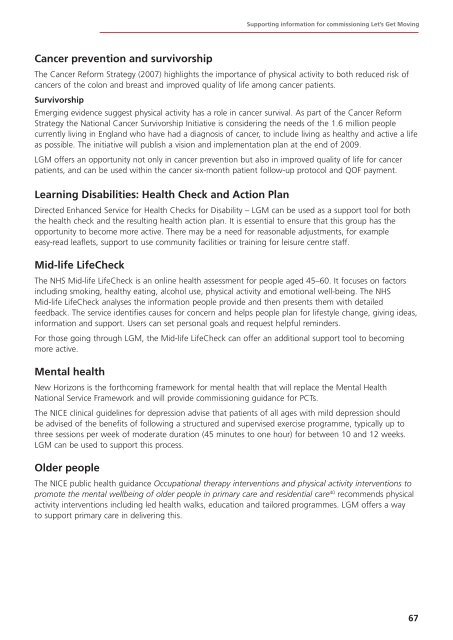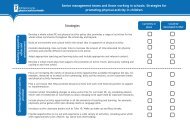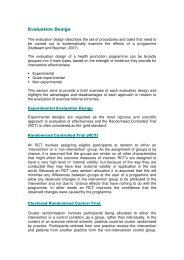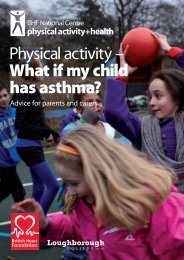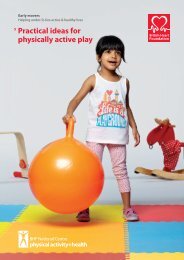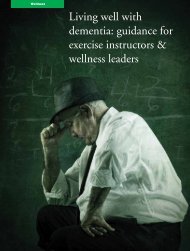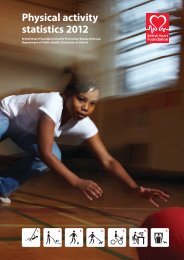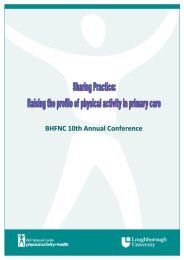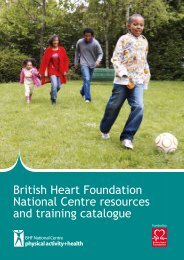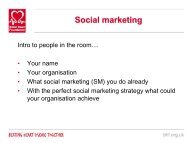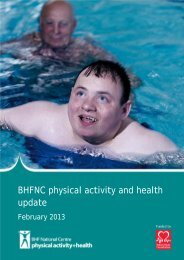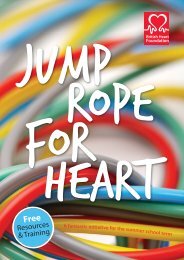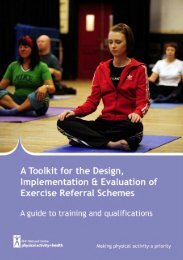Lets Get Moving - BHF National Centre - physical activity + health
Lets Get Moving - BHF National Centre - physical activity + health
Lets Get Moving - BHF National Centre - physical activity + health
Create successful ePaper yourself
Turn your PDF publications into a flip-book with our unique Google optimized e-Paper software.
Supporting information for commissioning Let’s <strong>Get</strong> <strong>Moving</strong>Cancer prevention and survivorshipThe Cancer Reform Strategy (2007) highlights the importance of <strong>physical</strong> <strong>activity</strong> to both reduced risk ofcancers of the colon and breast and improved quality of life among cancer patients.SurvivorshipEmerging evidence suggest <strong>physical</strong> <strong>activity</strong> has a role in cancer survival. As part of the Cancer ReformStrategy the <strong>National</strong> Cancer Survivorship Initiative is considering the needs of the 1.6 million peoplecurrently living in England who have had a diagnosis of cancer, to include living as <strong>health</strong>y and active a lifeas possible. The initiative will publish a vision and implementation plan at the end of 2009.LGM offers an opportunity not only in cancer prevention but also in improved quality of life for cancerpatients, and can be used within the cancer six-month patient follow-up protocol and QOF payment.Learning Disabilities: Health Check and Action PlanDirected Enhanced Service for Health Checks for Disability – LGM can be used as a support tool for boththe <strong>health</strong> check and the resulting <strong>health</strong> action plan. It is essential to ensure that this group has theopportunity to become more active. There may be a need for reasonable adjustments, for exampleeasy-read leaflets, support to use community facilities or training for leisure centre staff.Mid-life LifeCheckThe NHS Mid-life LifeCheck is an online <strong>health</strong> assessment for people aged 45–60. It focuses on factorsincluding smoking, <strong>health</strong>y eating, alcohol use, <strong>physical</strong> <strong>activity</strong> and emotional well-being. The NHSMid-life LifeCheck analyses the information people provide and then presents them with detailedfeedback. The service identifies causes for concern and helps people plan for lifestyle change, giving ideas,information and support. Users can set personal goals and request helpful reminders.For those going through LGM, the Mid-life LifeCheck can offer an additional support tool to becomingmore active.Mental <strong>health</strong>New Horizons is the forthcoming framework for mental <strong>health</strong> that will replace the Mental Health<strong>National</strong> Service Framework and will provide commissioning guidance for PCTs.The NICE clinical guidelines for depression advise that patients of all ages with mild depression shouldbe advised of the benefits of following a structured and supervised exercise programme, typically up tothree sessions per week of moderate duration (45 minutes to one hour) for between 10 and 12 weeks.LGM can be used to support this process.Older peopleThe NICE public <strong>health</strong> guidance Occupational therapy interventions and <strong>physical</strong> <strong>activity</strong> interventions topromote the mental wellbeing of older people in primary care and residential care 40 recommends <strong>physical</strong><strong>activity</strong> interventions including led <strong>health</strong> walks, education and tailored programmes. LGM offers a wayto support primary care in delivering this.67


